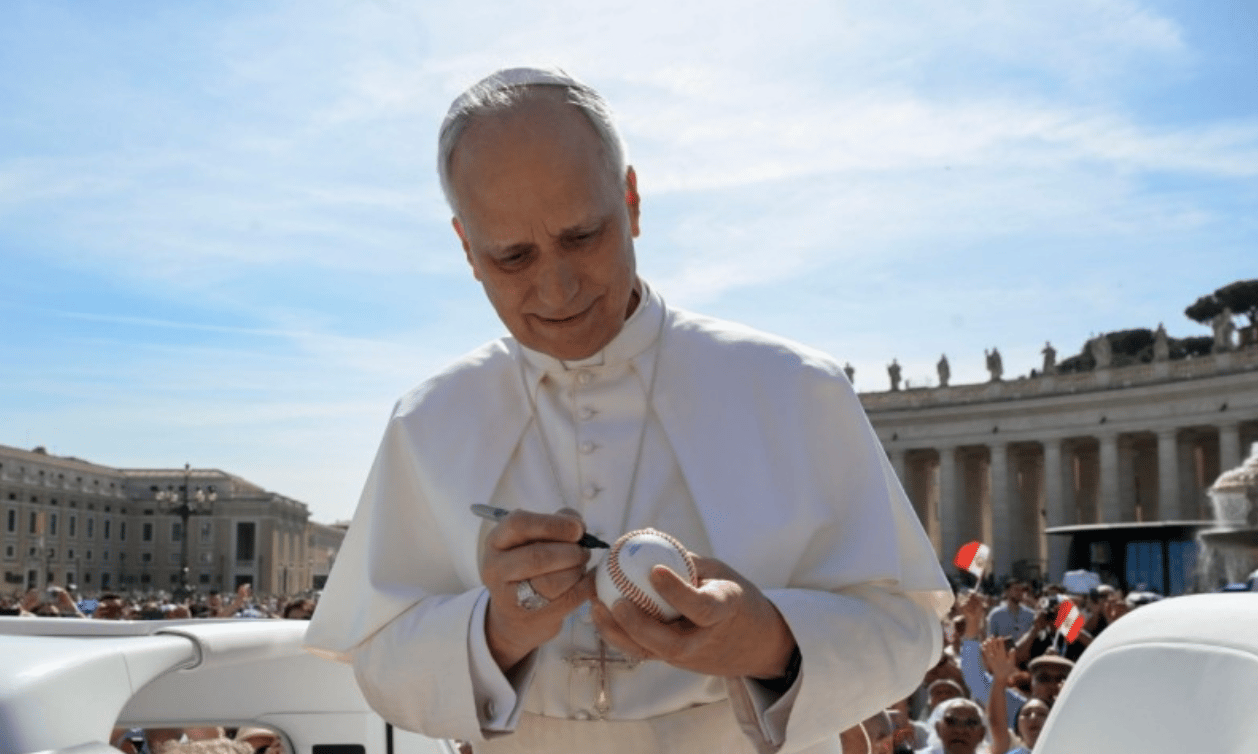Taunting Pope Leo about his favorite baseball team has become something of a tradition in the early months of his pontificate.
Images of then-Father Robert Prevost at Game 1 of the 2005 World Series – taking place at the home stadium of the Chicago White Sox – are circling Facebook. (The White Sox swept the Houston Astros that year, by the way.)
Since then, Facebook and X and other sites are showing Leo being presented baseball team shirts– sometimes for hated rivals of the White Sox, such as the Chicago Cubs.
Baseball is the national sport of the U.S., and as everyone knows, Pope Leo is the first pontiff from the United States.
Everyone, that is, but the Vatican – at least when it comes to language.
I worked for Vatican Radio for 15 years – serving under three popes – and it was made clear that the rise in the English language was to be resisted, at every level. To all appearances, it still is.
Pope St. John Paul II spoke perfect English, but when he spoke to groups of ambassadors, he spoke in French. Usually, these groups came from smaller nations that didn’t have embassies for the Vatican, so their Vatican ambassador was usually serving as an ambassador to another European country (ambassadors to Italy were not allowed to also be ambassadors to the Holy See.) These officials would often have lunch or dinner together after the pope’s address, and they spoke to each other in English, because that is the common language most ambassadors around the world speak.
But French is still considered the quasi-official language of diplomacy. At least, this was the claim of Vatican officials (and my French colleagues). Yet the fact is, English has been the lingua franca for nearly 100 years. It is the official language of air travel, science, and most international meetings.
Look at Pope Leo’s greetings to the English-speaking pilgrims at his general audience on Oct. 22: “I extend a warm welcome to the English-speaking pilgrims and visitors taking part in today’s Audience, especially those coming from England, Scotland, Denmark, Finland, the Netherlands, Burundi, Ghana, Nigeria, Uganda, Australia, Bahrain, India, Indonesia, Japan, Malaysia, Pakistan, the Philippines, Taiwan, Thailand, Saudi Arabia, Vietnam, Antigua and Barbuda, Canada and the United States of America.”
The funny thing is, the people in Taiwan speak Mandarin Chinese. English is very commonly spoken in Chinese-speaking countries. Italian rather less so. And there is a Mandarin-speaking person giving a summary of the pope’s Audience address in St. Peter’s Square. Pope Leo spoke to them briefly – in Italian.
Similarly, Bahrain and Saudi Arabia are Arabic-speaking countries. Again, an Arabic person summarized the pope’s statement, and Leo then briefly spoke to them in Italian. This happens as a matter of course at the weekly General Audiences.
Often, Pope Leo will make appeals with international significance – about Ukraine or Gaza, say – and they will be given in Italian. In today’s internet world – for the good or for ill – short videos are extremely popular. If the American pope made his appeal in English during an Audience or Angelus, it would more easily reach the public he – and the Vatican, at least in theory – wants to reach, especially younger people. Instead, he usually makes them in Italian.
Even simple things, like the full texts of his speeches in English translation, are slow to appear. Often French and Portuguese – even Polish or Arabic – appear before English.
Of course, the Vatican being more English-speaking has its obstacles. Most employees are from Italy, which has fewer really fluent English-speakers than one might expect. The wages are low, and that doesn’t encourage more qualified people, especially those with families.
English itself is an issue: The Vatican has never settled on an official English style or even which version of English the various offices ought to use. Reading translations from different offices – and sometimes even documents from the same office – can vary between the U.S. version and British English – sometimes with humorous outcomes. Words can mean different things, and that is a certainty you can place in your boot.
However, the biggest obstacle is the Roman Curia’s Italian DNA.
“Popes come and go, but the Curia remains,” Pope Leo said a few days after his election in May.
The papacy has certainly changed in the last half-century. When Pope St. John Paul II was elected in 1978, no one thought a non-Italian could become pope. When Francis was elected in 2013, no one thought a non-European could get the role. This year, pundits were certain a citizen of the United States could never win the vote of the cardinals. Pope Benedict XVI was the only man who entered the conclave with most people expecting him to come away with the job.
But the Curia didn’t really change and certainly hasn’t lost its Italian nature.
Perhaps the Vatican could make English a working language alongside Italian, which it already is in several areas, such as the Vatican Observatory. Most UN offices in Rome have two working languages, French and English.
Staff positions in the Curia should be advertised internationally, and some form of hiring oversight be established to curb nepotism.
Fewer of the Prefect/President and Secretary positions in the Curia should be given to Italians.
The Pope is the Bishop of Rome, and must be able to speak Italian: He has to be able to communicate with his flock. But English is an international language, and the mother tongue of the current occupant of the Chair of Peter. The Vatican should take advantage of the fact.
Follow Charles Collins on X: @CharlesinRome













